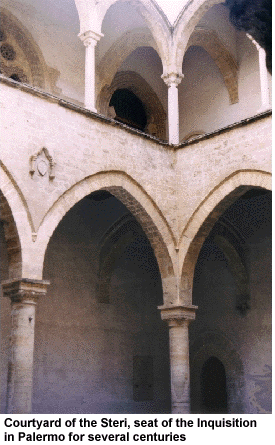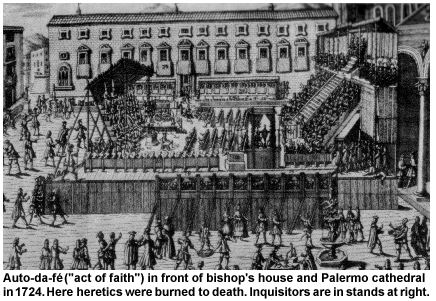...Best of Sicily presents... Best of Sicily Magazine. ... Dedicated to Sicilian art, culture, history, people, places and all things Sicilian. |
by Roberto Paglia | ||
Magazine Index Best of Sicily Arts & Culture Fashion Food & Wine History & Society About Us Travel Faqs Contact Map of Sicily |
As a parallel power structure, the Inquisition shadowed the civil state's institutions, with its own investigators, judges and enforcement (often torture of alleged heretics). Unless they died through torture, suspects were consigned to the secular state for execution. Nothing approaching a modern (or even medieval) standard of justice ever existed in the Inquisition. In 1231, the first Inquisition was established to punish heretics such as Cathars in the wake of the Albigensian Crusade against religious sects in southern France. The oft-excommunicated Frederick II lent this first phase of the Inquisition his nominal support, without implementing its orders in his multicultural realm. Not until 1478 did the infamous "Spanish Inquisition" rear its ugly head. By then, with Sicily ruled from Spain, it established an office in Palermo. By the 1600s, its seat was Palazzo Steri (shown here) in what is now Piazza Marina. The expuslion or conversion of Sicily's Jews in 1492 followed similar developments in Spain. Former Jews whose conversions to Catholicism were thought to be incomplete were tortured. In 1542, the Papacy instituted a more general Inquisition, the "Holy Office." Closely related to this was a congregation responsible for censorship. Its Index of Forbidden Books was not abolished until 1966 (under the auspices of the Second Vatican Council convened by Pope John XXIII). The judges of the Holy Office were usually overzealous Dominican friars opposed to the Reformation. In Sicily, where there were few Protestants or ex-Jews to persecute, the Inquisition was particuularly corrupt. A man might denounce his neighbor as a heretic in order to obtain his land. As nobody was exempt from prosecution, the Church often used the Inquisition to control the Sicilian nobility. Sicily was usually ruled from afar, and viceroys rarely defended the rights of the Inquisition's innocent victims. (In truth, most were innocent of any wrongdoing.) The Beati Paoli were a secret brotherhood established to resist the tyranny of the Inquisition. History has painted the Inquisition as a secretive phenomenon. In reality, some of its actions were all too public. The most spectacular was the auto-da-fé, the The Inquisition was formally abolished in Sicily in 1782 through the efforts of an enlightened and humane viceroy, and this brought an end to its trials and torture, but the Holy Office continued to practice its less violent --if more ideological-- repression freely until 1860, when the King of Italy greatly curtailed its power as part of an attempt to secularise the newly-united nation. The monarchs of the House of Savoy, though Catholic, had usually taken a tolerant view of Waldensians and Jews in their northern (Piedmontese) dominions, and by 1860 the Savoyard administration had a clear idea of the separation between Church and State. Nevertheless, vestiges of the Inquisition's social policies survived in Sicily for decades, reflected in things such as a general lack of original scholarship. The unitary Italian state may have been at odds with the Vatican from 1870 until 1929 (when the Lateran treaties were signed), but most Italians were still Catholics influenced by their Church. The degree to which centuries of Inquisition impeded social progress cannot be underestimated. Its effects were lasting ones. Sicilian intellectual life was virtually destroyed by the Spanish Inquisition. Despite a shadowy democracy, the Kingdom of Italy was a poor and underdeveloped country where press censorship and unjustified police searches were ordinary facts of life. Such conditions made it easy for a largely illiterate populace to accept Fascism in 1922, if only because the new regime seemed little changed from the old one --at least superficially. Rarely did the Catholic Church actively advocate personal liberties in Italy or abroad; for example, Italian women could not vote until 1946, and then only under Anglo-American occupation following the Second World War. The fault for this cannot be said to lie entirely with the Catholic Church, but social circumstances of this kind clearly suited the needs of the Holy Office long after the end of the Inquisition itself. Only during the pontificates of John XXIII and John Paul II, the two most distinguished popes of the twentieth century, was the spirit of the Inquisition tempered by a more humane approach to human rights. Had the Inquisition and its damaging effects been arrested earlier, a true middle class, alongside a larger intellectual class, might have evolved in Italy by 1900. The social impact of such a development can only be guessed at, but it certainly would have been beneficial. About the Author: Roberto Paglia has written several articles for this publication relating to social topics. | |
Top of Page |
 It was a particularly intolerant movement, and even today very few Catholic
schools in italy (or elsewhere) teach children very much about the horrors
of the Inquisition. The Inquisition was a series of efforts by the
Roman Catholic Church to control secular (non-ecclesiastical) society, ostensibly
in the interest of destroying heresy and alleged witchcraft, terms which
covered a vast range of imagined "offences" against the Faith.
In fact, the Inquisition was essentially a reactionary political tool which,
at various times, suppressed independence movements, Jews and then Protestants,
freedom of expression, the Enlightenment and fundamental principles of democracy
and equal rights among social classes. The Inquisition's ideas influenced
life in Italy well into the twentieth century. At its worst, it was a murderous and anti-intellectual movement whose victims were ideas as well as people.
It was a particularly intolerant movement, and even today very few Catholic
schools in italy (or elsewhere) teach children very much about the horrors
of the Inquisition. The Inquisition was a series of efforts by the
Roman Catholic Church to control secular (non-ecclesiastical) society, ostensibly
in the interest of destroying heresy and alleged witchcraft, terms which
covered a vast range of imagined "offences" against the Faith.
In fact, the Inquisition was essentially a reactionary political tool which,
at various times, suppressed independence movements, Jews and then Protestants,
freedom of expression, the Enlightenment and fundamental principles of democracy
and equal rights among social classes. The Inquisition's ideas influenced
life in Italy well into the twentieth century. At its worst, it was a murderous and anti-intellectual movement whose victims were ideas as well as people. inappropriately named "act of faith" attended by thousands of citizens for prayers and execution. The highlight was the burning of condemned "heretics." Such an event (shown here) may be compared, albeit loosely, to the witch executions occasionally incited by English Puritan colonists in America until 1692. Witchcraft was punishable by death in English law, but the Salem witch executions, like the Inquisition's executions, were instigated by zealous clergy involved in local quarrels.
inappropriately named "act of faith" attended by thousands of citizens for prayers and execution. The highlight was the burning of condemned "heretics." Such an event (shown here) may be compared, albeit loosely, to the witch executions occasionally incited by English Puritan colonists in America until 1692. Witchcraft was punishable by death in English law, but the Salem witch executions, like the Inquisition's executions, were instigated by zealous clergy involved in local quarrels.